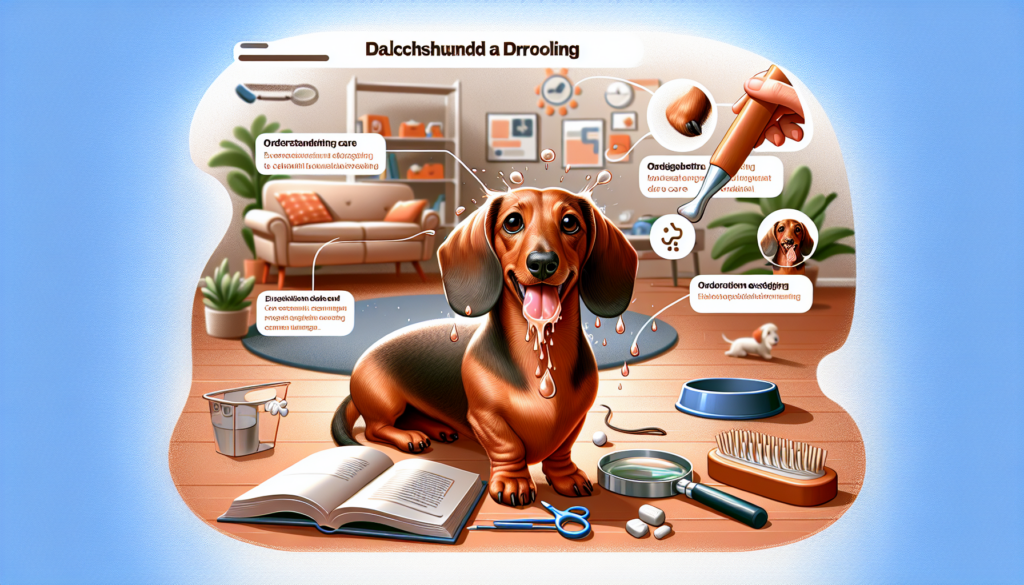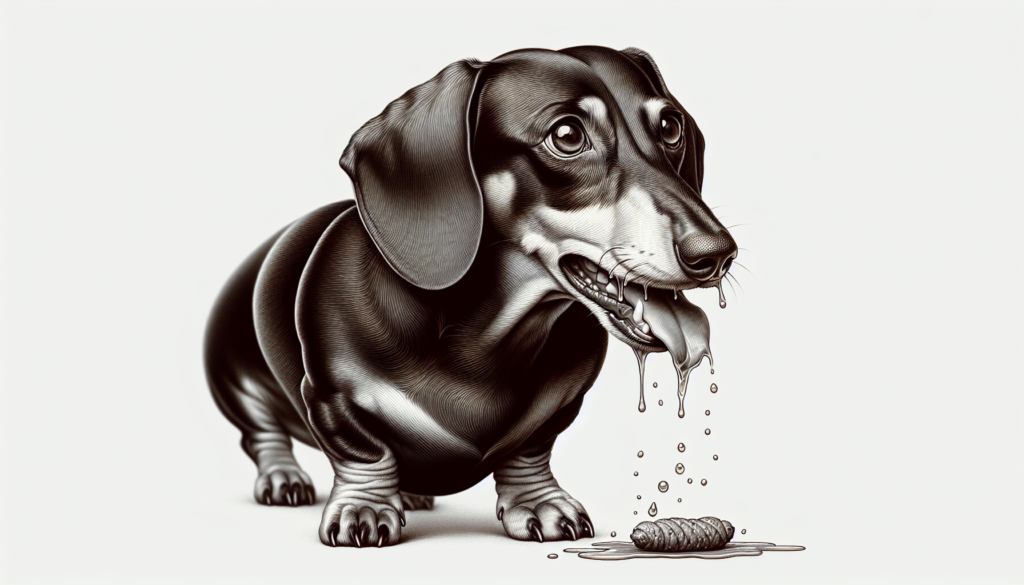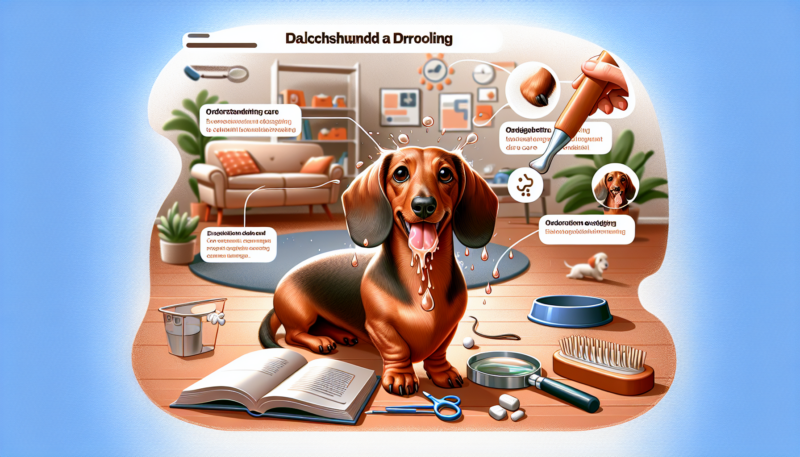Ever wondered if Dachshunds, those adorable little wiener dogs, drool a lot? Well, the answer may surprise you! Dachshunds are not typically known for excessive drooling, unlike some other breeds. While all dogs produce some saliva, Dachshunds are generally considered to be on the lower end of the drooling scale. So, if you’ve been hesitant about adding one of these spunky dogs to your family because of drooling concerns, you can rest assured knowing that Dachshunds are not likely to leave a slobber trail all over your house.
Do Dachshunds Drool A Lot
Dachshunds are adorable and lively little dogs that have captured the hearts of many dog lovers. If you are considering getting a Dachshund as a pet, you may be wondering about their drooling tendencies. In this article, we will explore the topic of drooling in Dachshunds, covering everything from understanding the breed to managing drooling effectively.
Understanding Dachshunds
Before we delve into the topic of drooling, let’s take a moment to understand Dachshunds better. Dachshunds, also known as “wiener dogs” or “sausage dogs,” originated in Germany several centuries ago. They were bred to hunt badgers, hence their long bodies and short legs.
Dachshunds come in a variety of coat types, including the smooth, wirehaired, and longhaired varieties. They have an unmistakable appearance with their elongated bodies, short legs, and long snouts. Dachshunds are known for their playful and friendly nature, making them excellent companions and family pets.
What is Drooling in Dogs?
Drooling, also known as hypersalivation, refers to the excessive production of saliva from a dog’s salivary glands. While some level of drooling is normal for dogs, excessive drooling can be a cause for concern. Saliva plays an essential role in a dog’s digestion and oral health, but when drooling becomes excessive, it may indicate an underlying issue.

Dachshund Saliva Production
Dachshunds, like all dogs, have salivary glands that produce saliva. Saliva is a combination of water, enzymes, and mucus that helps with lubrication, digestion, and maintaining oral health. The amount of saliva produced by a Dachshund can vary from dog to dog.
While Dachshunds generally do not have a reputation for excessive drooling, some individuals may drool more than others. Factors such as age, genetics, diet, and environmental conditions can influence the amount of saliva a Dachshund produces.
Factors That Influence Drooling
Various factors can influence the drooling tendencies of Dachshunds. Let’s explore some of the key factors that can contribute to drooling in these charming dogs.
Age of the Dachshund
Age can play a role in a Dachshund’s drooling tendencies. Puppies, in general, may drool more than adult dogs as they are still developing and their saliva production may not be fully regulated.
Breed Genetics and Characteristics
The genetics and physical characteristics of a Dachshund can also influence their drooling tendencies. Some Dachshunds may have more prominent jowls or loose lips that can lead to increased saliva production and potential drooling.
Diet and Eating Habits
Diet and eating habits can impact a Dachshund’s saliva production. Certain foods, especially those that are particularly flavorful or aromatic, can stimulate saliva production. Additionally, factors like the speed at which a Dachshund eats or the type of food they consume can affect their drooling tendencies.
Temperature and Environment
External factors such as temperature and environment can also contribute to drooling. Warm weather, humidity, and stressful or anxiety-inducing situations can cause a Dachshund to drool more than usual.
Anxiety and Stress Levels
Dachshunds, like many other dog breeds, can experience anxiety and stress. These emotional factors can trigger increased saliva production and subsequent drooling. It’s essential to provide a calm and comfortable environment for your Dachshund to help manage and minimize their stress levels.

Health Conditions That Cause Excessive Drooling
In some cases, excessive drooling in Dachshunds may be a symptom of an underlying health condition. Here are a few possible health issues that can cause increased drooling in these dogs:
Oral Health Issues
Periodontal disease, dental infections, or foreign objects lodged in the mouth can all lead to excessive drooling. It’s crucial to maintain good oral hygiene for your Dachshund by regularly brushing their teeth and providing chew toys to promote dental health.
Gastrointestinal Problems
Certain gastrointestinal issues, such as gastric reflux or inflammation, can result in increased drooling in Dachshunds. These conditions may also be accompanied by other symptoms like vomiting or diarrhea.
Respiratory Infections
Respiratory infections, such as kennel cough or pneumonia, can cause respiratory distress and excessive drooling in Dachshunds. If your dog is showing signs of respiratory issues, it is best to consult with a veterinarian for proper diagnosis and treatment.
Allergies and Irritations
Allergies to certain foods, environmental factors, or substances can trigger excessive drooling in Dachshunds. Additionally, irritations from insect bites or contact with toxic substances can also cause increased drooling.
Neurological Disorders
In rare cases, neurological disorders can result in hypersalivation and excessive drooling in Dachshunds. It is essential to consult with a veterinarian if you suspect any neurological issues in your dog.
Common Misconceptions About Dachshunds and Drooling
There are various misconceptions regarding Dachshunds and drooling. Let’s clarify a few of these common misunderstandings:
Dachshunds and Hypersalivation
While some Dachshunds may drool more than others, it is important to distinguish between normal drooling and hypersalivation. Hypersalivation is excessive drooling and often indicative of an underlying health issue, whereas occasional drooling is generally considered normal.
Dachshunds and Slobbering
Slobbering, characterized by excessive saliva production that hangs from the mouth, is not typically associated with Dachshunds. Dachshunds are known for being relatively clean dogs and do not have a reputation for slobbering excessively.
Comparisons with Other Breeds
When it comes to drooling, Dachshunds generally do not drool as much as some other breeds known for their slobbering tendencies, such as the Saint Bernard or the Bloodhound. However, it’s important to remember that drooling can still vary among individual Dachshunds.
Tips for Managing Drooling in Dachshunds
If your Dachshund is drooling excessively, here are some tips to help manage and minimize the issue:
Maintaining Good Oral Hygiene
Regular dental care, including brushing your Dachshund’s teeth and providing appropriate chew toys, can help prevent oral health issues that may contribute to excessive drooling.
Proper Feeding Techniques
Consider feeding your Dachshund smaller meals more frequently rather than one large meal. This can help reduce the chances of overeating or eating too quickly, which can trigger excessive saliva production.
Keeping a Clean Environment
Maintaining a clean environment, including regularly washing your Dachshund’s bedding and keeping their living area clean, can help minimize the presence of allergens or irritants that may contribute to drooling.
Reducing Anxiety and Stress
Providing a calm and secure environment for your Dachshund can help reduce their anxiety and stress levels, which may contribute to excessive drooling. Consider implementing relaxation techniques or providing comforting toys or blankets.
Consulting a Veterinarian
If your Dachshund’s drooling is persistent, accompanied by other concerning symptoms, or if you suspect an underlying health issue, it is crucial to consult with a veterinarian. They can conduct a thorough examination and provide appropriate diagnosis and treatment.
Dachshund Breeds with Less Drooling Tendency
While drooling tendencies can vary among individual Dachshunds, some Dachshund breeds may be less prone to excessive drooling. These include:
Wirehaired Dachshunds
Wirehaired Dachshunds have a denser and coarser coat, which may result in less noticeable drool.
Longhaired Dachshunds
Longhaired Dachshunds have longer hair that can help keep saliva from dripping or being visible.
Smooth Dachshunds
Smooth Dachshunds, with their sleek and short coat, may exhibit minimal drooling.
Miniature Dachshunds
Miniature Dachshunds, although they share the same genetic traits as their standard-sized counterparts, may show a reduced tendency to drool excessively.
Mixed Dachshund Breeds
Mixed breeds involving Dachshunds may inherit traits that reduce drooling tendencies. However, it is important to note that this can vary widely depending on the genetic traits inherited.
Conclusion
Dachshunds, in general, do not have a reputation for excessive drooling. However, individual Dachshunds may vary in their drooling tendencies depending on factors such as age, genetics, diet, and health conditions. By understanding these factors and implementing appropriate management techniques, you can ensure your Dachshund remains happy, healthy, and drool-free.
Further Resources
If you would like to learn more about Dachshunds and their drooling tendencies, here are some recommended resources:
Books and Publications
- “The Dachshund Handbook” by D. Caroline Coile
- “Dachshunds for Dummies” by Eve Adamson
Online Dachshund Communities
- Dachshund Club of America website
- Dachshund-related forums and Facebook groups
Professional Veterinary Associations
- American Veterinary Medical Association (AVMA)
- British Veterinary Association (BVA)
Remember, if you have any concerns about your Dachshund’s drooling or general health, always consult with a qualified veterinarian for expert advice and guidance.
